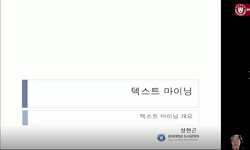Digital parties are being discussed due to demands for innovation and reform. In order to examine the possibility of the emergence of digital political parties in Korea, this study focused on factors that could suppress the emergence of digital partie...
http://chineseinput.net/에서 pinyin(병음)방식으로 중국어를 변환할 수 있습니다.
변환된 중국어를 복사하여 사용하시면 됩니다.
- 中文 을 입력하시려면 zhongwen을 입력하시고 space를누르시면됩니다.
- 北京 을 입력하시려면 beijing을 입력하시고 space를 누르시면 됩니다.
부가정보
다국어 초록 (Multilingual Abstract)
Digital parties are being discussed due to demands for innovation and reform. In order to examine the possibility of the emergence of digital political parties in Korea, this study focused on factors that could suppress the emergence of digital parties through analysis of existing surveys and content analysis through text mining. As a result of the analysis, it was found that the online political participation rate of Koreans was similar to the offline political participation rate, and they were expressing their opinions on policies to the ruling party through an online website. They also had the possibility of positive recognition of digital parties. However, the requirements for party establishment under the Party Act are becoming increasingly strict, and in the changing times, established political parties are changing by introducing digital technology. Therefore, the possibility of digital political parties appearing in Korea seems low. If an established party can introduce digital technology and solve the problems that arise under representative democracy in the flow of change of the times, people's trust in the party will increase and mature representative democracy will be realized before finding an alternative to the digital party.
국문 초록 (Abstract)
대의민주주의의 위기 속에서 기성정당은 변화를 넘어서 혁신과 개혁의 요구에 직면하고 있으며 새로운 플랫폼을 , 통한 정당 형태에 대해서도 논의의 필요성이 증대되고 있다. 본 연구는 한...
대의민주주의의 위기 속에서 기성정당은 변화를 넘어서 혁신과 개혁의 요구에 직면하고 있으며 새로운 플랫폼을 , 통한 정당 형태에 대해서도 논의의 필요성이 증대되고 있다. 본 연구는 한국에서의 디지털 정당 출현 가능성에 대해 고찰하고자, 기존 설문조사 분석 및 텍스트마이닝 을 통한 내용분석 등을 디지털 정당의 출현을 억제할 수 있는 요인들에 중점을 두어 살펴보았다. 분석결과 한국인은 오프라인 정치참여와 비슷한 수준의 온라인 정치참여율을 보이고 있었으며, 여당을 중심으로 온라인 홈페이지를 통해 정책에 대한 의견을 개진하고 있었다. 또한 디지털 정당에 대해서도 긍정적인 인식의 가능성이 나타났다. 그러나 정당법상 정당설립 요건은 점차 엄격해지고 있으며, 기성정당은 디지털 기술을 도입해 변화하고 있다. 시대적 변화의 흐름 속에 서 기성정당이 디지털 기술을 도입하고 대의민주주의하에서 나타나는 문제점들을 해결할 수 있다면, 디지털 정당이라는 대체제를 찾기 이전에 정당에 대한 국민의 신뢰가 높아지고 더 나아가 참여와 숙의가 동반된 성숙한 대의민주주의를 이룰 수 있을 것이다.
참고문헌 (Reference)
1 김지범, "한국종합사회조사 2003-2018" 성균관대학교 출판부 2018
2 김진주, "한국의 정당, 어디로 가야 하는가"
3 강원택, "제한적 정당 경쟁과 정당 활동의 규제: 정당법의 기원과 변천을 중심으로" 한국정당학회 14 (14): 5-32, 2015
4 김예원, "정보화시대, 모바일 투표의 가능성과 한계에 관한 일 고찰 - 민주통합당의 모바일 투표 사례를 중심으로" 한국사회역사학회 17 (17): 131-154, 2014
5 박지영, "정보화 시대 대의민주주의 위기 극복을 위한 한국형 정당모델의 모색" 미래정치연구소 9 (9): 119-142, 2019
6 정진웅, "정당 중심의 대의 민주주의와 4차 산업혁명 : 참여와 심의의 조화로운 발전 모색" 한국정치학회 53 (53): 79-99, 2019
7 김효정, "온라인 정당 ‘규제개혁당’, 창당 발기인 대회 2월 4일 개최"
8 윤성이, "디지털 시대의 정당개혁" 한국시민윤리학회 23 (23): 131-152, 2010
9 이석민, "디지털 민주주의 플랫폼의 민주주의: 디지털 정당 사례를 중심으로" 민주주의와 자치 연구소 16 (16): 35-55, 2020
10 임혁백, "대한민국의 위기는 어디서 오는가?" 16-92, 2017
1 김지범, "한국종합사회조사 2003-2018" 성균관대학교 출판부 2018
2 김진주, "한국의 정당, 어디로 가야 하는가"
3 강원택, "제한적 정당 경쟁과 정당 활동의 규제: 정당법의 기원과 변천을 중심으로" 한국정당학회 14 (14): 5-32, 2015
4 김예원, "정보화시대, 모바일 투표의 가능성과 한계에 관한 일 고찰 - 민주통합당의 모바일 투표 사례를 중심으로" 한국사회역사학회 17 (17): 131-154, 2014
5 박지영, "정보화 시대 대의민주주의 위기 극복을 위한 한국형 정당모델의 모색" 미래정치연구소 9 (9): 119-142, 2019
6 정진웅, "정당 중심의 대의 민주주의와 4차 산업혁명 : 참여와 심의의 조화로운 발전 모색" 한국정치학회 53 (53): 79-99, 2019
7 김효정, "온라인 정당 ‘규제개혁당’, 창당 발기인 대회 2월 4일 개최"
8 윤성이, "디지털 시대의 정당개혁" 한국시민윤리학회 23 (23): 131-152, 2010
9 이석민, "디지털 민주주의 플랫폼의 민주주의: 디지털 정당 사례를 중심으로" 민주주의와 자치 연구소 16 (16): 35-55, 2020
10 임혁백, "대한민국의 위기는 어디서 오는가?" 16-92, 2017
11 장우영, "뉴미디어와 ICTs/Leadership 정당: 현대 정당의 변화와 지속" 21세기정치학회 20 (20): 1-30, 2010
12 임유진, "남부 유럽의 테크노 포퓰리스트 정당과 당내 민주주의에 대한 비판적 검토: 포데모스와 오성운동의 정당 조직과 정치적 결정과정" 한국사회역사학회 23 (23): 193-221, 2020
13 구경우, "국민의힘 ‘디지털정당’ 가동 … 서울시장 ‘디지털 선거’ 예고"
14 송경재, "e-party, 정당위기의 대안인가?" 21세기정치학회 17 (17): 21-44, 2007
15 Mi felder, P, "Young people’s β engagement in ‘new’parties’" 12 (12): 243-248, 2013
16 Karpf, David., "Two provocations for the study of digital politics in time" 17 (17): 87-96, 2019
17 Mudde, Cas, "Transformations of Populism in Europe and the Americas: History and Recent Tendencies" 2016
18 Gerbaudo, Paolo, "The Digital Party and Online Democracy" Pluto Press 2019
19 Gibson, Rachel K., "Party change, social media and the rise of ‘citizen-initiated’campaigning" 21 (21): 183-197, 2015
20 Vittori, Davide, "Membership and members’ participation in new digital parties : Bring back the people" 18 : 609-629, 2020
21 Fenton, Natalie., "Left out? Digital media, radical politics and social change" 19 (19): 346-361, 2016
22 Chadwick, Andrew, "Internet Politics: States, Citizens, and New Communication Technologies" Oxford University Press 2006
23 Monge, P. R., "Handbook of organizational communication" Sage 304-342, 1987
24 Kneuer, Marianne, "E-democracy and the Matter of Scale. Revisiting the Democratic Promises of the Internet in Terms of the Spatial Dimension" 2020
25 Sampedro, Victor, "Digital Media, Contentious Politics and Party Systems in Italy and Spain" 25 (25): 160-168, 2018
26 Gibson, R., "Conceptualizing and measuring participation in the age of the internet: Is online political engagement really different to offline?" 75 (75): 2013
27 Lutz, C., "Beyond just politics: A systematic literature review of online participation" 19 (19): 2014
28 Dommett, Katharine, "Are digital parties the future of party organization? A symposium on The Digital Party:Political Organisation and Online Democracy by Paolo Gerbaudo" 51 (51): 136-149, 2021
29 Gerbaudo, Paolo, "Are digital parties more democratic than traditional parties? Evaluating Podemos and Movimento 5 Stelle’s online decision-making platforms" 1-13, 2019
30 Hartleb, Florian, "Anti-elitist cyber parties?" 13 (13): 355-369, 2013
동일학술지(권/호) 다른 논문
-
“12시면 최종투표율을 알 수 있다!”: 선거 당일 시간대별 투표율 분석과 예측모델
- 중앙선거관리위원회
- 이준한
- 2021
- KCI등재
-
제20대 국회 「공직선거법」 개정 과정을 통해 본 정치관계법 개정 절차 개선의 필요성: 중앙선거관리위원회의 개정의견 제출권을 중심으로
- 중앙선거관리위원회
- 박성진
- 2021
- KCI등재
-
국민주권주의(헌법 제1조 제2항)와 헌법재판소의 결정: 비판적 분석을 중심으로
- 중앙선거관리위원회
- 김해원
- 2021
- KCI등재
-
- 중앙선거관리위원회
- 김순양
- 2021
- KCI등재
분석정보
인용정보 인용지수 설명보기
학술지 이력
| 연월일 | 이력구분 | 이력상세 | 등재구분 |
|---|---|---|---|
| 2024 | 평가예정 | 재인증평가 신청대상 (재인증) | |
| 2021-01-01 | 평가 | 등재학술지 선정 (계속평가) |  |
| 2019-01-01 | 평가 | 등재후보학술지 선정 (신규평가) |  |
| 2018-12-01 | 평가 | 등재후보 탈락 (계속평가) | |
| 2016-01-01 | 평가 | 등재후보학술지 선정 (신규평가) |  |
학술지 인용정보
| 기준연도 | WOS-KCI 통합IF(2년) | KCIF(2년) | KCIF(3년) |
|---|---|---|---|
| 2016 | 0 | 0 | 0 |
| KCIF(4년) | KCIF(5년) | 중심성지수(3년) | 즉시성지수 |
| 0 | 0 | 0 | 0 |




 KCI
KCI




